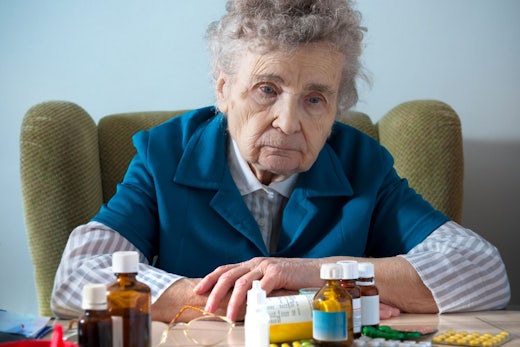Medication safety could improve for more than 60 percent of Aussies in aged care homes
What is adverse event monitoring and how could this affect Aussies in aged care homes?
![<p>Many older Australians are prescribed medications, but researchers suggest better monitoring of side effects in aged care homes is key. [Source: Shutterstock]</p>](https://agedcareguide-assets.imgix.net/news/articles/wp/groupnurse1607.jpg?fm=pjpg&format=auto&w=550&q=65)
Many older Australians are prescribed medications, but researchers suggest better monitoring of side effects in aged care homes is key. [Source: Shutterstock]
Key points:
- Monash University researchers have identified ten signs to monitor certain effects of medication in older Australians in aged care facilities
- Approximately 60 percent of older Australians in aged care homes are prescribed antidepressants according to researchers from the Swinburne University of Technology
- Researchers in another Australian study identified that older people who are prescribed antipsychotic medications have a ‘higher risk of mortality’
Monash University researchers have recently determined the top 10 signs to identify adverse health events for aged care residents who take psychotropic medications.
Approximately 60 percent of older Australians living in aged care homes are prescribed antidepressants which are a class of psychotropic drugs, according to researchers from the Swinburne University of Technology.
Psychotropic drugs are defined as medications that can impact the mind, emotions and behaviour. The three main classes of these medications are:
- antidepressants, e.g. fluoxetine and sertraline;
- antipsychotics, e.g. olanzapine and paliperidone;
- benzodiazepines, e.g. diazepam and lorazepam.
Other Australian researchers identified that taking ‘antipsychotics after moving to residential aged care facilities is associated with a higher risk of mortality.’
As ‘psychotropic medication use is common among older adults in all settings, including the community, assisted living and long-term care,’ Monash University researchers created a new monitoring checklist to improve care for older Australians.
This is expected to assist healthcare professionals in more accurate monitoring of older Australians who use psychotropic medications in aged care homes.
The top 10 signs and symptoms identified as adverse events in the recently published study were ‘recent falls, daytime drowsiness or sleepiness, abnormal movements [such as] shaking or stiffness, confusion or disorientation, balance problems, dizziness, postural hypotension, reduced self-care, restlessness and dry mouth.’
Brigid McInerney, a PhD candidate at the Centre for Medicine Use and Safety and a Monash Health pharmacist, commented on the importance of updating aged care medication monitoring methods.
“Medication safety is a national health priority area and residents of aged care facilities are at high risk of experiencing medication-related harm. Our findings will empower nurses and aged care workers to identify when residents are experiencing side effects,” she said.
“Australia’s new guidelines recommend all health professionals involved in prescribing, dispensing or administering a psychotropic medication for a resident should be familiar with the adverse event monitoring protocol and this protocol should be available to residents and their carers’ as well.”
The new guidelines are available online on the Australian Commission on Safety and Quality in Health Care website. Relevant information is also available for consumers, health professionals and healthcare services.
Adverse event monitoring is important to ensure the safety of people taking the medications. Incidents can then be reported to the Therapeutic Goods Administration for further investigation if required.
The TGA is the organisation that regulates ‘therapeutic goods including prescription medicines, vaccines, sunscreens, vitamins and minerals, medical devices, blood and blood products’ in Australia.
Ms McInerney highlighted the necessity of a research-based checklist to monitor and ensure the safety of aged care residents using psychotropic medications.
“We anticipate that this short, easy-to-use checklist can be for routine use in different residential aged care facilities. This may facilitate proactive monitoring and early detection of adverse drug events and avoid further medication-related harm,” she said.
The monitoring tool checklist is available online and can be printed for hard-copy storage in patients’ files.
Due to mistakes or other problems caused by taking the medication incorrectly, almost 250,000 Australians are hospitalised each year.
Not only does this highlight the possibility of taking medications incorrectly due to different dosing and strengths, but it also means that finding a way of managing your medications can help reduce the risk.
Finding ways for older Australians to manage their medications can make daily life easier.
Approximately 40 percent of Australians over the age of 75 are prescribed five or more different medications, according to recent data from the Australian Commission on Safety and Quality in Health Care.
Different medication management options are available through pharmacies which can be organised by yourself or people you trust. These can include seven-day pill organisers, seven-day disposable blister packets and disposable daily sachets.
To get started, visit your local pharmacy to discuss the medicine packing options available to suit you. You can read more about different types of medication management options in this article: What’s the best way to manage my medications?
What are your thoughts on the new checklist to help monitor the effects of medications in older Australians?
Let the team at Talking Aged Care know on social media.
For more information and news in the aged care industry, subscribe to our free newsletter.
Relevant content:
Could Micro Towns be the future of dementia care?
Eighty percent of older Aussies are not confident about their online safety
A new government strategy could impact how your personal information is shared






















